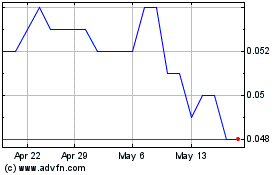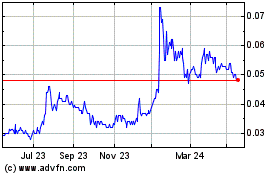UPDATE: Australia Predicts Uranium Production To Double In Four Years
May 13 2011 - 2:10AM
Dow Jones News
Australia on Friday delivered an upbeat outlook for its uranium
export industry, shrugging off concerns that an ongoing nuclear
crisis in Japan will sap demand for the fuel.
Australia's uranium production is expected to double in the next
four years and quadruple within 20 years, Resources and Energy
Minister Martin Ferguson said.
Production in recent years has been hampered by wet weather at
the Ranger mine in Australia's Northern Territory and a shaft
failure at Olympic Dam in South Australia state, which has since
been repaired.
"We are already the world's third-largest uranium producer, with
nearly half of the world's low-cost uranium reserves, and further
opportunities on the horizon," Ferguson told an industry
gathering.
His comments show that key policymakers still see a future for
atomic power despite a severe earthquake and tsunami in March
crippling a Japanese nuclear facility and prompting nations
including China, India, Germany and Switzerland to review new
nuclear builds.
"Nuclear is an important part of the energy mix for many
countries," Ferguson said. "It is a cleaner energy option and
powers millions of homes and businesses around the world."
Despite its vast resources, Australia is losing ground as a
producer of uranium to emerging economies such as Kazakhstan,
Namibia and Niger. In 2009, Australia produced 7,156 metric tons of
uranium oxide -- just 13% of the global total.
Ranger produced 9% of the world's uranium in 2009 but it is
scheduled to close its main pit next year, while Jabiluka, a vast
resource close to Ranger, may never be developed due to Aboriginal
land-rights concerns.
Offsetting these projected declines, Ferguson said Uranium One
Inc.'s (UUU.T) Honeymoon uranium mine in South Australia is
expected to start in the "next few months".
BHP Billiton Ltd. (BHP) is currently considering an expansion of
Olympic Dam, which Ferguson said could boost its uranium output
eight-fold.
The diversified mining giant said Friday that it has moved
closer to approving the expansion after gaining government approval
to release to the public updated plans to meet environmental,
social and economic concerns.
The company is working on a feasibility study and Chief
Executive Marius Kloppers in February said an investment decision
on whether to proceed was expected within 12 months.
Australia's Greens party, a key power broker in parliament,
discourages the export of Australian uranium offshore.
"Nuclear power should be phased out before it phases itself out.
The industry is in fairly serious trouble globally," Greens Senator
Scott Ludlam told Dow Jones Newswires.
The Greens are already key to propping up Prime Minister Julia
Gillard's minority government in the lower house. From July, the
environmentalist party will hold the balance of power in the upper
house further bolstering its negotiating hand.
Ludlum, however, said that the Greens can't find a large enough
number of fellow lawmakers to propose a complete ban on new uranium
mines. "I could do that this afternoon but I don't have the numbers
on it," Ludlum said.
The Greens will "keep the blow torch" on improving safety rules
imposed on uranium miners, he said.
-By Ross Kelly, Dow Jones Newswires; 61-2-8272-4692;
Ross.Kelly@dowjones.com
Energy Resources Of Aust... (ASX:ERA)
Historical Stock Chart
From Jun 2024 to Jul 2024

Energy Resources Of Aust... (ASX:ERA)
Historical Stock Chart
From Jul 2023 to Jul 2024
